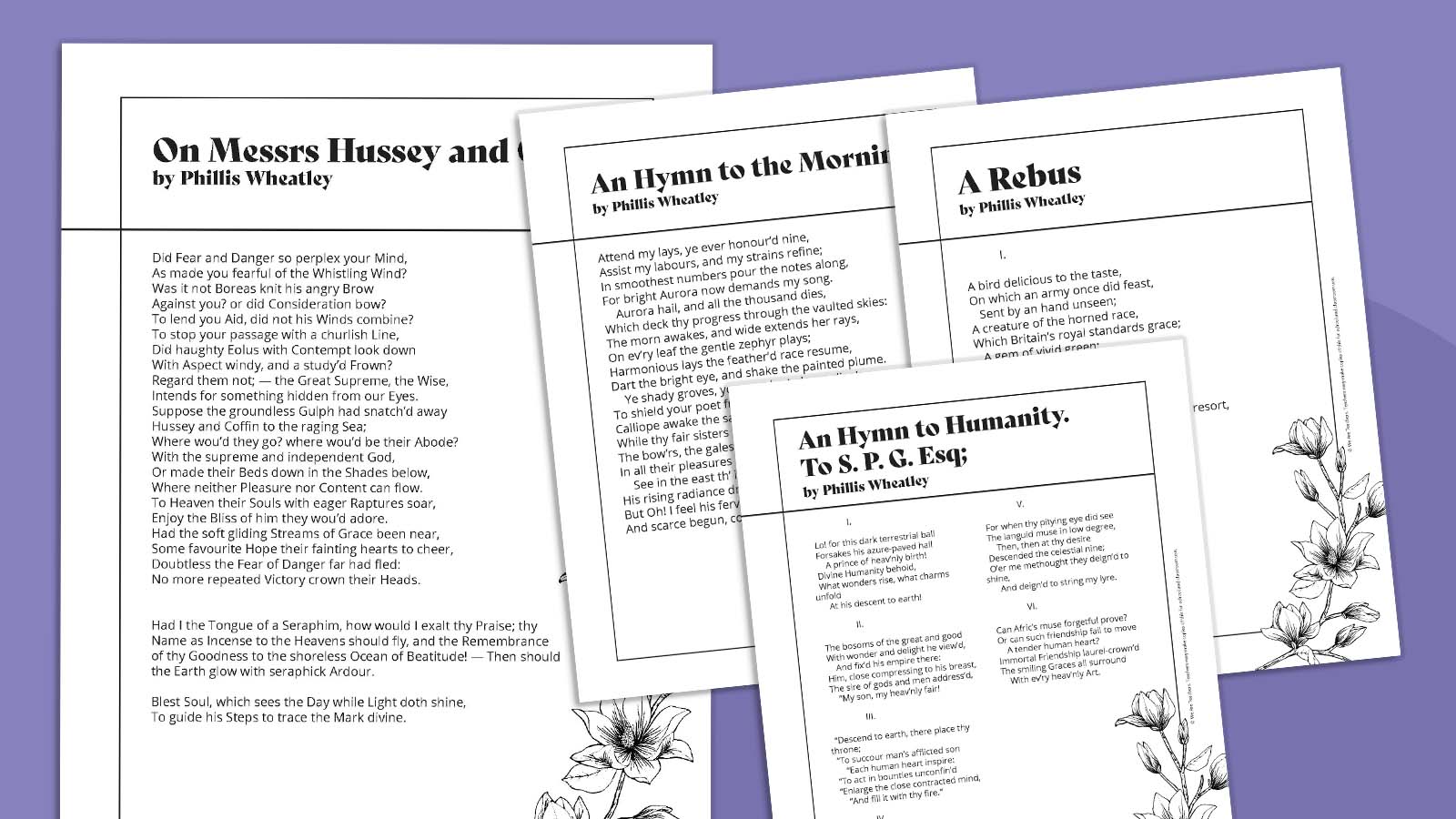Phillis Wheatley became one of the best-known poets in 18th-century America. When her poems became well known, Wheatley’s work became a catalyst for the antislavery movement. For today’s students, poems by Phillis Wheatley shed light on colonial America and provide firsthand insight into a perspective we don’t hear often.
The 25 Phillis Wheatley poems below are among her best and show how strong she was at her craft, and how she helped shape the opinions of colonial men and women. Get the full text of each poem as a free printable to use with your students by filling out the form on this page. You’ll notice some grammatical and spelling imperfections have been maintained as they were originally written.
Jump to:
Who Was Phillis Wheatley?
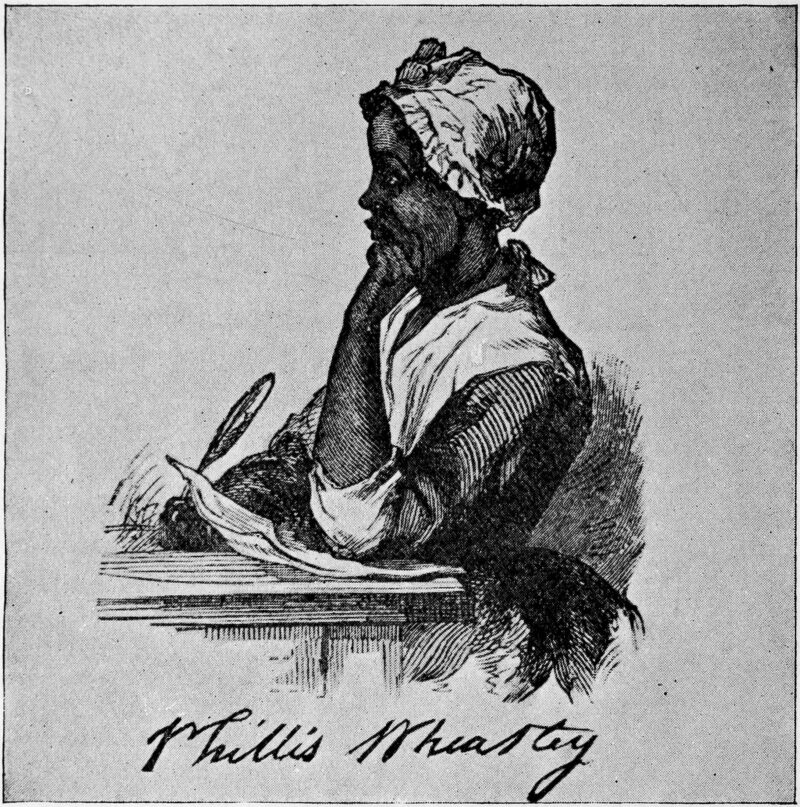
Phillis Wheatley (1753-1784) was born in Senegal or Gambia, West Africa. When she was around 7 years old, she was captured and taken to Boston with other “refugee” slaves who were, because of frailty or age, not suitable for rigorous labor. Phillis was bought by Susanna Wheatley, wife of a prominent tailor. She was enslaved by the Wheatleys, who recognized that she was particularly bright and taught her to read and write. In 1773, Phillis Wheatley became the first African American woman to publish a book of poems, Poems on Various Subjects, Religious and Moral. She was freed shortly after its publication.
Famous Phillis Wheatley Poems
On Messrs Hussey and Coffin
Suppose the groundless Gulph had snatch’d away
Hussey and Coffin to the raging Sea;
Where wou’d they go? where wou’d be their Abode?
This poem tells the story of two shipwrecked sailors, Hussey and Coffin, and uses their story to explore themes of faith and the power of God. It was the first poem that Wheatley published, on December 21, 1767, in a Rhode Island newspaper.
His Excellency General Washington
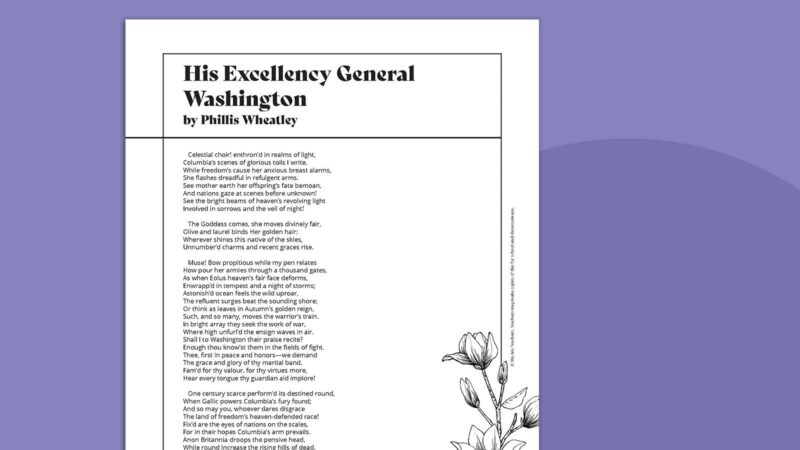
Proceed, great chief, with virtue on thy side,
Thy ev’ry action let the Goddess guide.
A crown, a mansion, and a throne that shine,
With gold unfading, WASHINGTON! Be thine.
Wheatley met George Washington and wrote this poem for him in 1775. In the poem, Wheatley encourages Washington to continue fighting for American independence and uses couplets that draw on an epic tradition, including referencing the Muses and her description of Washington and his army.
To the King’s Most Excellent Majesty. 1768.
Great God, direct, and guard him from on high,
And from his head let ev’ry evil fly!
And may each clime with equal gladness see
A monarch’s smile can set his subjects free!
Another political poem, this one explores the repeal of the Stamp Act. Read this one alongside “His Excellency George Washington” to analyze how Wheatley’s opinions were evolving.
A Farewel to America. To Ms. S. W.
Adieu, New-England’s smiling meads,
Adieu, the flow’ry plain:
I leave thine op’ning charms, O spring,
And tempt the roaring main.
Use this poem to better understand Wheatley’s life and feelings about America and the people who enslaved her. Wheatley was a catalyst for the antislavery movement. Discuss how her poetry may have influenced prominent leaders to stand up against slavery.
On Being Brought From Africa to America.
Some view our sable race with scornful eye,
“Their colour is a diabolic die.”
Remember, Christians, Negroes, black as Cain,
May be refin’d, and join th’ angelic train.
Wheatley was taken from Africa when she was a young girl. This poem about being a slave and that everyone, regardless of skin color, can be “refined” and be godly is one of her most famous poems.
On Virtue.
But, O my soul, sink not into despair,
Virtue is near thee, and with gentle hand
Would now embrace thee, hovers o’er thine head.
This poem is interesting because it’s written in unrhymed iambic pentameter. It’s a freer verse for Wheatley to use when exploring virtue, a quality personified as female.
To a Lady and Her Children, on the Death of Her Son and Their Brother.
O’erwhelming sorrow now demands my song:
From death the overwhelming sorrow sprung.
Wheatley wrote many poems about how dangerous colonial life was, including this example about high child mortality rates. Read it alongside other poems about colonial life to get a fuller picture of what Wheatley experienced.
An Hymn to the Evening.
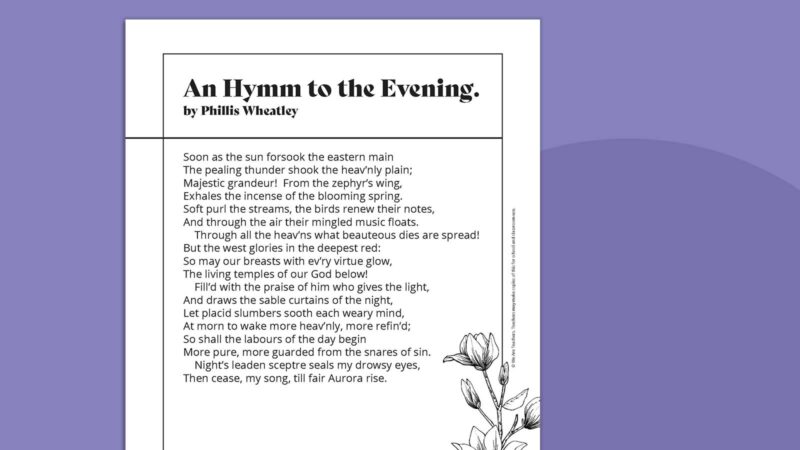
So shall the labours of the day begin
More pure, more guarded from the snares of sin.
Night’s leaden sceptre seals my drowsy eyes,
Then cease, my song, till fair Aurora rise.
This poem is focused on describing the evening, and it is written like a hymn, complete with meditation on God as the creator. The imagery in this poem is pleasant, and it has a structure of rhyming lines that students can analyze.
On Imagination
Now here, now there, the roving Fancy flies,
Till some lov’d object strikes her wand’ring eyes,
Whose silken fetters all the senses bind,
And soft captivity involves the mind.
Wheatley wrote many poems exploring concepts like virtue and, in this poem, imagination. Here, she admires human minds and our ability to imagine. She lays out dreaming as our best experience, something both beautiful and fun. Her use of personification is particularly strong in this poem.
To S. M., a Young African Painter, on Seeing His Works
When first thy pencil did those beauties give,
And breathing figures learnt from thee to live,
How did those prospects give my soul delight,
A new creation rushing on my sight?
Wheatley wrote this poem after seeing Scipio Moorhead’s work. Moorhead was an enslaved African artist living in America. Wheatley begins by mentioning his talent, and then implores him to focus his art on immortal subjects. She also connects painting with art and poetry.
To the University of Cambridge, in New-England.
Improve your privileges while they stay,
Ye pupils, and each hour redeem, that bears
Or good or bad report of you to heav’n.
Wheatley engaged in many of the typical poetic practices of the time. She invoked the muses, used many references to religious imagery, and provided some information about herself. Then, she got into the meat of her message. Her main goal was to address students at Harvard University, asking them to improve their “privileges” and use their time to do good deeds. This poem is a great one for line-by-line analysis.
On the Death of a Young Lady of Five Years of Age.
From dark abodes to fair etherial light
Th’ enraptur’d innocent has wing’d her flight;
On the kind bosom of eternal love
She finds unknown beatitude above.
In a poem about child mortality, a common occurrence in colonial life, Wheatley writes to the parents of a 5-year-old, encouraging them to imagine where their child is now and how to move through grief. This poem is a more direct writing and can be used for literal interpretation activities.
An Hymn to the Morning
Attend my lays, ye ever honour’d nine,
Assist my labours, and my strains refine;
In smoothest numbers pour the notes along,
For bright Aurora now demands my song.
This poem, the complement to “Hymn to the Evening,” extols the wonders of the morning. Use it to analyze how Wheatley wrote about the morning and what else morning might mean (the start of something new, for example).
Atheism
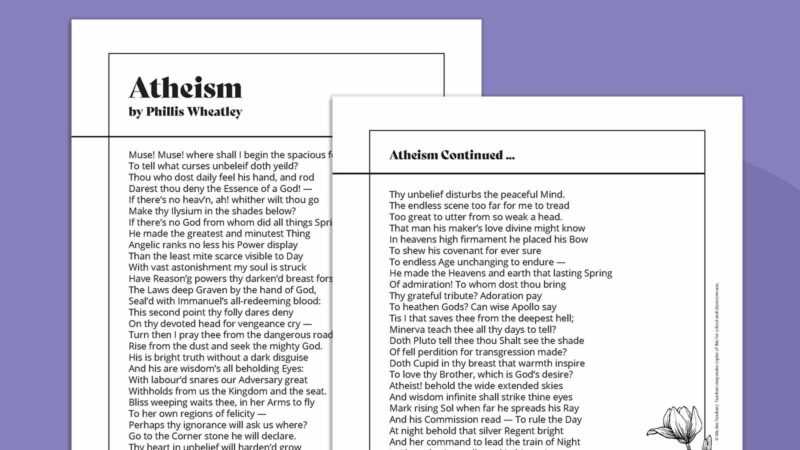
Muse! Muse! where shall I begin the spacious feild
To tell what curses unbeleif doth yeild?
Thou who dost daily feel his hand, and rod
Darest thou deny the Essence of a God!—
Colonial America was distinctly religious, and many of Wheatley’s poems reflect that. This one, though, explores atheism and talks directly to those who do not believe in God. Within the context of the Enlightenment, it shows the religious debates that were going on at the time and Wheatley arguing for faith to help create a rational universe.
On the Death of Mr. Snider Murder’d by Richardson
In heavens eternal court it was decreed
How the first martyr for the cause should bleed
To clear the country of the hated brood
He whet his courage for the common good
This poem about the killing of Christopher Seider in 1770 was controversial. (Seider’s name was misspelled “Snider” in local reports, where Wheatley got her information.) Wheatley expresses frustration and anger over the murder, comparing it to the killing of Achilles in “The Iliad.” It was not published in her original works, perhaps because it was so emotional. It’s an early, effective example of protest literature.
America
They praise Industry but no pride commence
To raise their own Profusion, O Brittain See
By this, New England will increase like thee
Political tensions were high in pre-Revolutionary America. Wheatley explores the ideas that her contemporaries were discussing using the metaphor of mother and son, or Britain and America. This poem is a great one to analyze to discuss politics, racial injustice, and the American colonies.
On Friendship
Let amicitia in her ample reign
Extend her notes to a Celestial strain
Benevolent far more divinely Bright
Amor like me doth triumph at the sight
This is a short poem that requires a lot of analysis, particularly for vocabulary. It is an unusual poem for the time as it focuses on female friendship, not romantic relationships.
Goliath of Gath
The dreadful scenes and toils of war I write,
The ardent warriors, and the fields of fight:
You best remember, and you best can sing
The acts of heroes to the vocal string …
A great example of an epic poem (just the length is epic), this is Wheatley’s retelling of the David and Goliath story. Use the poem to discuss imagery and language used to create a truly impressive narrative. It’s also another example of how Wheatley used the Bible to show then-contemporary struggles.
A Rebus
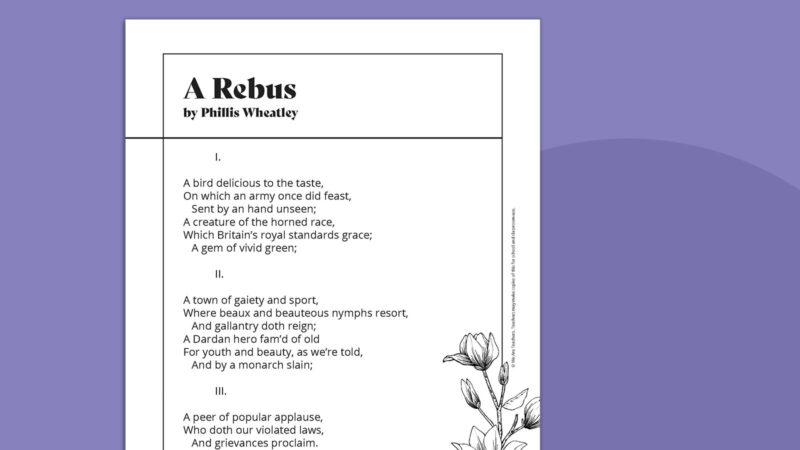
A bird delicious to the taste,
On which an army once did feast,
Sent by an hand unseen …
A rebus is a series of riddles, each line describing a different concept. It explores themes of food, social status, and art. For Wheatley, it’s a playful and fun poem (no death or politics). It’s a way to show students how colonists appreciated wordplay and puzzles, as well as Wheatley’s versatility as a poet.
An Answer to the Rebus, by the Author of These Poems
The poet asks, and Phillis can’t refuse
To show th’ obedience of the Infant muse.
This poem provides an answer to a rebus, or a puzzle where words are represented by symbols. It has many of the hallmarks of Wheatley’s poems, including the references to the British monarchy and other political events.
On Recollection
Mneme begin. Inspire, ye sacred nine,
Your vent’rous Afric in her great design.
Mneme, immortal pow’r, I trace thy spring:
Assist my strains, while I thy glories sing …
This poem is a challenge for modern readers to analyze, so students will need support with some background knowledge. Mneme is the Greek goddess of memory, and Wheatley uses her story to guide the memory of past events. Wheatley writes in a sonnet format, with a regular pattern (ABBA ABBA CDCDCD). This poem also includes lots of figurative language for students to unpack.
Ode to Neptune
While raging tempests shake the shore,
While Aeolus’ thunders round us roar,
And sweep impetuous o’er the plain
Be still, O tyrant of the main …
Wheatley knew her classic references, and this poem is all about Neptune and his power. It’s a good starting point to explore how Wheatley used mythology and classic characters in her poetry.
Thoughts on the Works of Providence
Arise, my soul, on wings enraptur’d, rise
To praise the monarch of the earth and skies,
Whose goodness and benificence appear
As round its centre moves the rolling year …
This (long) poem celebrates the beauty and organization in the universe, with references to Christianity. It’s an example of neoclassical poetry and philosophy with a focus on rationality and observation. Use a stanza if the entire poem is too long to analyze and dissect.
To a Lady on Her Remarkable Preservation
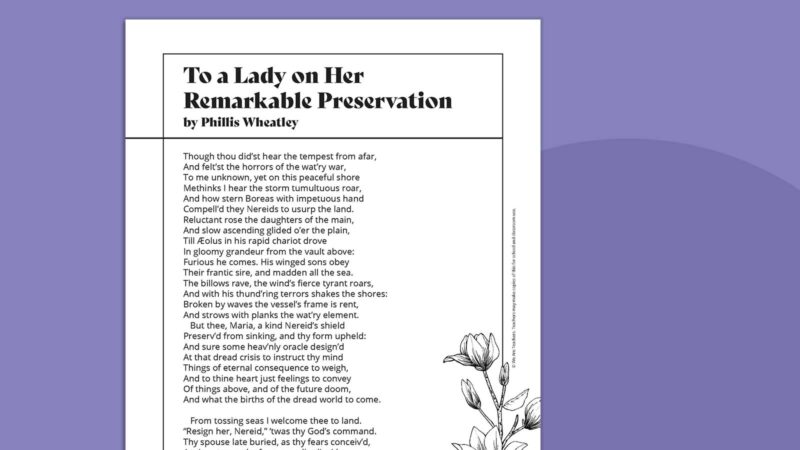
Though thou did’st hear the tempest from afar,
And felt’st the horrors of the wat’ry war,
To me unknown, yet on this peaceful shore
Methinks I hear the storm tumultuous roar …
This is the story of a storm at sea and the rescue of a woman named Maria. It’s a good example of 18th-century poetry and storytelling. It’s also a great poem to put side by side with other poems that are narratives to show students how poetry can tell a story.
An Hymn to Humanity. To S. P. G. Esq.;
Lo! for this dark terrestrial ball
Forsakes his azure-paved hall
A prince of heav’nly birth!
A poem with all the hallmarks of a hymn, this is an example of how Wheatley handled celebratory emotion and wonder. Read one stanza alone, or read the entire thing. This poem is a good one to read aloud as it lends itself to lots of emotion.
Get free printables of all of these Phillis Wheatley poems!
Share your email address for instant access to full-text printable versions of all the Phillis Wheatley poems on this list.
